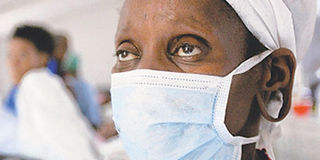TB curable, but current efforts wanting

A TB patient wears a mask. Photo/FILE
What you need to know:
- TB is largely driven by factors related to poverty, poor access to health care services, and limited awareness and education. Many TB sufferers live in the poorest and most vulnerable communities, such as migrants, miners, prisoners, drug users and sex workers.
- A TB evaluation commonly includes questions on how you are feeling, an examination of your chest, and a chest X-ray. You do not have the disease if the chest X-ray looks normal and you are not experiencing any of the symptoms.
Monday (March 24), the public and global health community commemorated World Tuberculosis Day. This day highlights the suffering that tuberculosis (TB) continues to exert on people despite effective control measures.
Globally, nine million people get sick with TB every year but one third do not get the TB services that they need and deserve.
TB is common among individuals with weakened immune systems and HIV/Aids patients. Statistics show that a person living with HIV is about 20 to 30 times more likely to develop active TB, resulting in 25 per cent of HIV-related deaths.
TB is largely driven by factors related to poverty, poor access to health care services, and limited awareness and education. Many TB sufferers live in the poorest and most vulnerable communities, such as migrants, miners, prisoners, drug users and sex workers.
According to the Stop TB Partnership, “TB is curable, but our current efforts to find, treat and cure everyone who gets ill with the disease are not sufficient.
“We believe that no one should be left behind in the fight against TB. This World TB Day, we call for a global effort to find, treat and cure the three million and accelerate progress towards zero TB deaths, infections, suffering and stigma,” said Dr Luis Sambo, the World Health Organisation’s Regional Director for Africa.
“It is estimated that TB killed more than half a million people in the region last year. The threat of drug-resistant TB and multi-drug resistant TB continues to be a serious problem, complicating TB treatment,” Dr Sambo adds. The primary causes of multi-drug resistant TB include inappropriate treatments, incorrect use of anti-TB drugs and the use of poor-quality medicines.
“We must invest in basic research and research and development of new tools — diagnostics, drugs and vaccines — in order to reach people faster, treat them more quickly and ultimately prevent them from becoming ill with TB,” adds Dr Sambo.
Early treatment requires understanding the most common symptoms of TB. Active TB often presents with chest pains, weakness, weight loss, fever, night sweats and a cough with sputum and blood at times.
ACTIVE FORM OF THE DISEASE
TB is spread by respiratory secretions of individuals who have TB bacteria in their lungs. It’s important to note that most people who become infected with TB do not have the active form of the disease. People with “latent TB” will have a positive TB skin test but they do not have any other symptoms. These people are not contagious and cannot give the infection to others.
A person should see a health care provider anytime they have a cough (especially with sputum) for longer than two weeks. An evaluation is needed in order to make sure that you do not have the actual disease.
A TB evaluation commonly includes questions on how you are feeling, an examination of your chest, and a chest X-ray. You do not have the disease if the chest X-ray looks normal and you are not experiencing any of the symptoms.
TB is a treatable and curable disease. Active, drug-sensitive TB is treated with a standard six-month course of four antimicrobial drugs that are provided with information, supervision and support by a qualified health care worker or trained volunteer.
Dr Couillard is an international health columnist that works in collaboration with the World Health Organisation’s goals of disease prevention and control. Views do not necessarily reflect endorsement.




